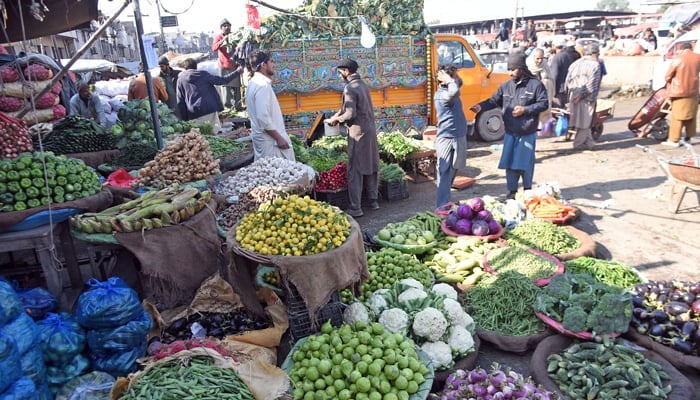Climbing prices make survival difficult
Rawalpindi : Amidst climbing prices, residents of the city are finding it hard to survive. The number of people below the poverty line is increasing. The poor, as well as lower-middle-class people, have been suffering the most as a result.
“I have noticed a sharp increase in commodity prices and living costs in recent months, which means my family has to eat less. We have decided to eat less to survive in this difficult time. From house rent to the edible oil price, every cost of living has been on the rise,” says Hussain Naqi. “Feeling the pinch of surging commodity prices in every aspect of life, I have stopped using Uber and pushed myself to use public transport to adjust to the price hike. The number of beggars is also increasing in the street,” says Ahmad Hasan.
“Customers come out to buy daily essentials at area markets or superstores in different locations of the city but overcharging on essential commodities continues. Unscrupulous wholesale or retail traders try to capitalize on the situation and raise prices,” says Mateen Abbas.
“Although transportation of essential products and services are on, traders are reported to be charging double the price of a product citing a shortage or no transportation of items in the supply chain,” says Azhar Ali.
“Most shopkeepers and grocery stores have not displayed the government price list and those that have displayed the government price list are not selling commodities at the notified rates,” says Fazeelat Shabeer.
“Wholesalers and retailers claim that the district administration has set wrong prices for several commodities. They do not agree with prices mentioned in the government price lists, they say they are less than their purchase price,” adds Fazeelat.
“Traders also sell sub-standard commodities at inflated rates. No official is available to check them. There is none to implement a price control system in letter and spirit. The district administration has not been able to control prices of essential commodities effectively even though the government has launched a crackdown against hoarders and profiteers,” says Talaat Hussain.
“After receiving complaints from residents about the arbitrary behaviour of the store and shopkeepers, officials visited all grocery stores, fruits, and vegetable vendors and told them if any complaints come from customers that they are selling the daily need products at an extra price, action will be taken against them,” says Nazli Taqi. “Despite the arbitrary price being charged by sellers, officials have not given any punishment to the shop owners and grocery stores except giving warning to them,” adds Nazli.
Salamat Ali says, “I think the government should draft a long-term plan to keep the market safe from price hikes. There must be a monitoring mechanism to stop corrupt traders from increasing prices. The government agencies should act together in this regard.”
-
 ChatGPT Caricature Prompts Are Going Viral. Here’s List You Must Try
ChatGPT Caricature Prompts Are Going Viral. Here’s List You Must Try -
 James Pearce Jr. Arrested In Florida After Alleged Domestic Dispute, Falcons Respond
James Pearce Jr. Arrested In Florida After Alleged Domestic Dispute, Falcons Respond -
 Cavaliers Vs Kings: James Harden Shines Late In Cleveland Debut Win
Cavaliers Vs Kings: James Harden Shines Late In Cleveland Debut Win -
 2026 Winter Olympics Snowboarding: Su Yiming Wins Bronze And Completes Medal Set
2026 Winter Olympics Snowboarding: Su Yiming Wins Bronze And Completes Medal Set -
 Trump Hosts Honduran President Nasry Asfura At Mar-a-Lago To Discuss Trade, Security
Trump Hosts Honduran President Nasry Asfura At Mar-a-Lago To Discuss Trade, Security -
 Cuba-Canada Travel Advisory Raises Concerns As Visitor Numbers Decline
Cuba-Canada Travel Advisory Raises Concerns As Visitor Numbers Decline -
 Anthropic Buys 'Super Bowl' Ads To Slam OpenAI’s ChatGPT Ad Strategy
Anthropic Buys 'Super Bowl' Ads To Slam OpenAI’s ChatGPT Ad Strategy -
 Prevent Cancer With These Simple Lifestyle Changes
Prevent Cancer With These Simple Lifestyle Changes -
 Air Canada Flight Diverted St John's With 368 Passengers After Onboard Incident
Air Canada Flight Diverted St John's With 368 Passengers After Onboard Incident -
 Experts Reveal Keto Diet As Key To Treating Depression
Experts Reveal Keto Diet As Key To Treating Depression -
 Inter Miami Vs Barcelona SC Recap As Messi Shines With Goal And Assist
Inter Miami Vs Barcelona SC Recap As Messi Shines With Goal And Assist -
 David Beckham Pays Tribute To Estranged Son Brooklyn Amid Ongoing Family Rift
David Beckham Pays Tribute To Estranged Son Brooklyn Amid Ongoing Family Rift -
 Jailton Almeida Speaks Out After UFC Controversy And Short Notice Fight Booking
Jailton Almeida Speaks Out After UFC Controversy And Short Notice Fight Booking -
 Extreme Cold Warning Issued As Blizzard Hits Southern Ontario Including Toronto
Extreme Cold Warning Issued As Blizzard Hits Southern Ontario Including Toronto -
 Lana Del Rey Announces New Single Co-written With Husband Jeremy Dufrene
Lana Del Rey Announces New Single Co-written With Husband Jeremy Dufrene -
 Ukraine-Russia Talks Heat Up As Zelenskyy Warns Of US Pressure Before Elections
Ukraine-Russia Talks Heat Up As Zelenskyy Warns Of US Pressure Before Elections




